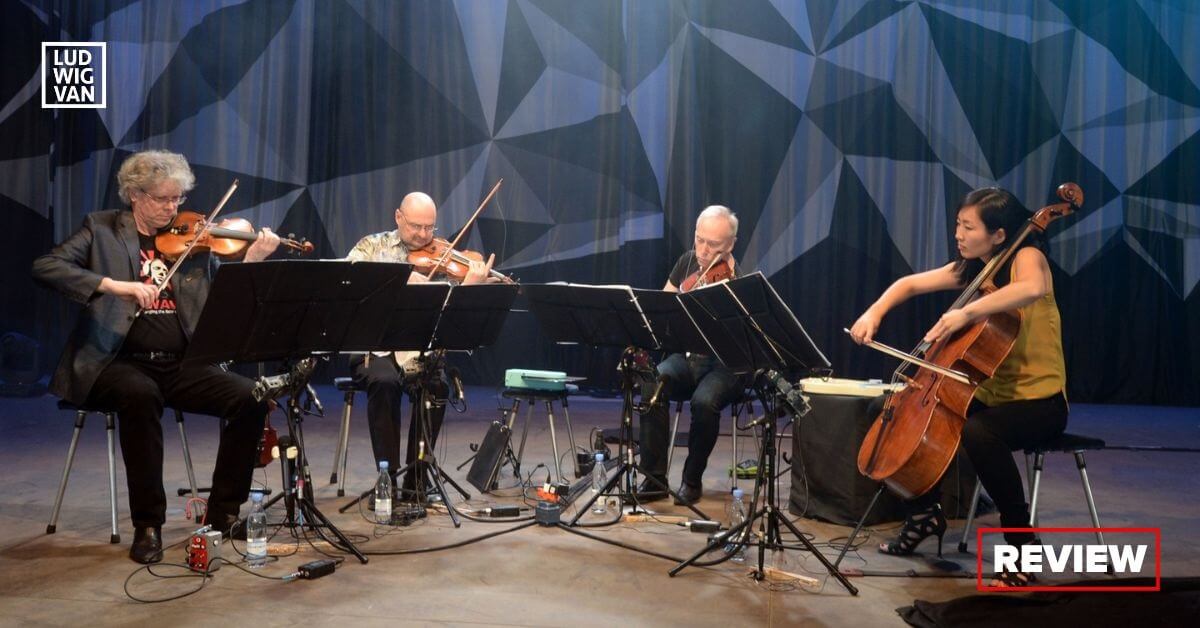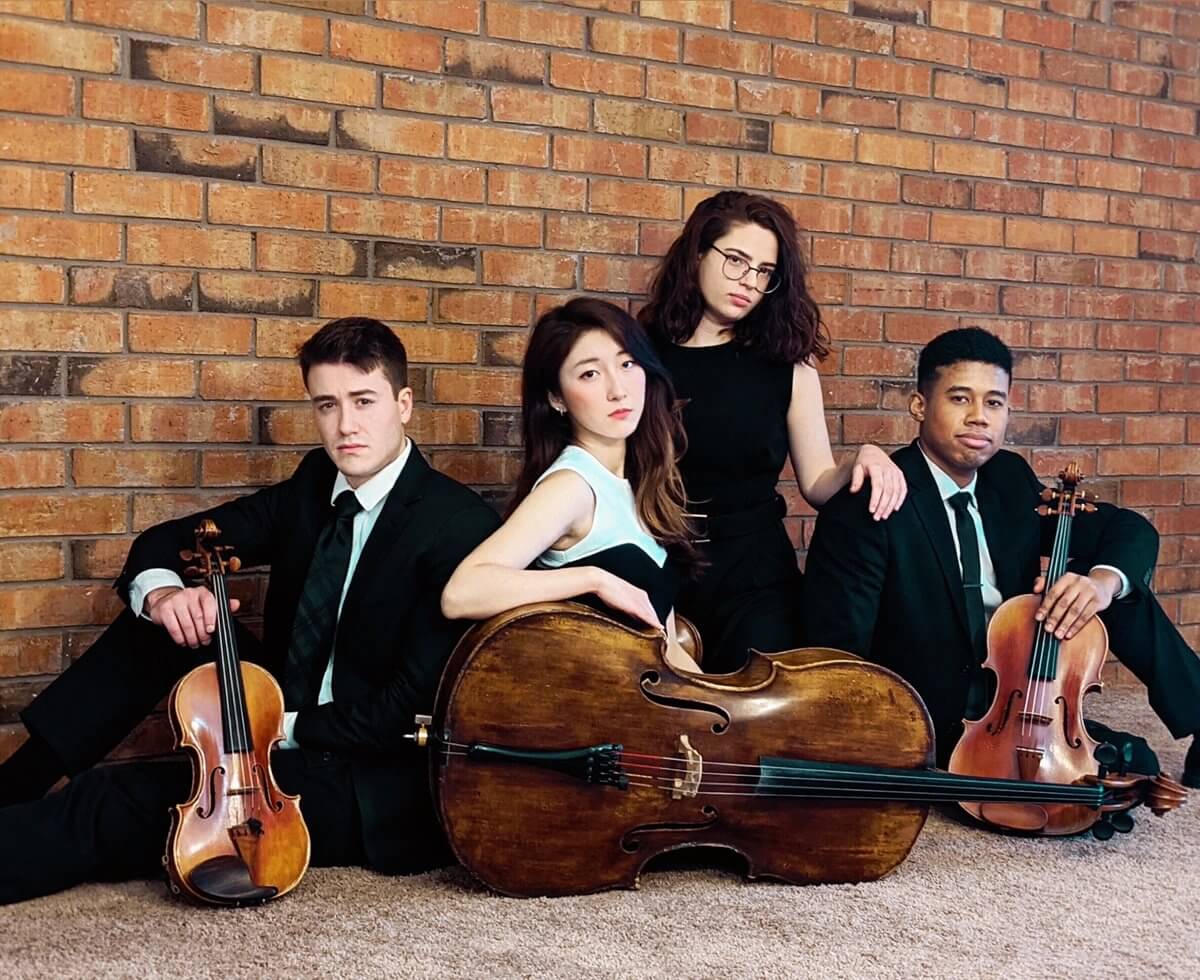
Fifty for the Future: Nine Works. Kronos Quartet, Dior Quartet, Taylor Academy Quartet, Glenn Gould School Quartet. December 8, 2022, Mazzeloni Concert Hall, Toronto.
No other string quartet has ever lasted as long or so daringly transcended the traditional boundaries of classical music. Now in its 50th year, the San Francisco-based Kronos Quartet has commissioned and performed more than 1,000 new compositions, many incorporating world music, jazz, rock or multimedia, often in collaboration with non-classical vocalists and instrumentalists from around the world.
The latest and greatest of the quartet’s commissioning projects, Fifty for the Future: the Kronos Learning Repertoire, was on display last night at the Mazzoleni Concert Hall, as the Kronos Quartet and three quartets from The Royal Conservatory performed nine works from this newly-created library of compositions, designed as an online training resource for students and young professionals.
Over the five years beginning in 2015-2016, 25 men and 25 women were commissioned to compose pieces lasting from five to 15 minutes, graded in difficulty from beginner to professional, resulting in 52 works, their scores, parts, and supporting materials downloadable without charge. (Canadian Nicole Lizée and Wu Man from China each contributed an extra composition.) David Harrington, the quartet’s founding violinist and Artistic Director, says that the project’s international roster of 50 composers “reflects the globe-spanning state of the art of the string quartet in the 21st century.”
Leading off was the Dior Quartet, The Royal Conservatory’s Quartet-in-Residence — violinists Noa Sarid and Tobias Elser, violist Caleb Georges and cellist Joanne Yesol Choi. Composer Soo Yeon Lyuh, who performs on the haegeum, a two-stringed Korean instrument, says her Yessori (Sound from the Past), “explores aspects of Korean traditional music,” using the string quartet as “an extension of the haegeum.” In four sections, wailing incantation alternates with folkloric dances, cellist Choi’s gong-striking adding to the piece’s ritual-like exoticism.
From the Book by Yotam Haber was performed by the Taylor Academy Quartet — violinists Nicholas Vasilakopoulos-Kostopoulos and Ophir Strumpf, violist Angela Sievers and cellist Ethan Jeon, students at the Taylor Performance Academy. Haber says it’s based on a Jewish liturgical melody from Italy, but I failed to hear any Judaic elements in this dreamy, nostalgic music that becomes increasingly disturbed before returning to the opening’s serenity.
The Glenn Gould School Quartet — student violinists Tiffany Tsai and Tiffany Yeung, violist Tristan Macaggi and cellist Shun-Ming Yang — performed Aleksandra Vrebalov’s My Desert, My Rose. It opens with a mournful cello solo, the other instruments then joining in a lament that grows from gloom to anguish, gaining energy towards its propulsive climax.

The Kronos Quartet — violinists Harrington and John Sherba, violist Hank Dutt and cellist Sunny Yang — then took the stage for the remaining six works, all of them containing minimalism’s characteristic repetition of brief melodic phrases. Maduswara by Peni Candra Rini, a performer of sinden, a female style of Javanese gamelan singing, featured slow, repeated melodic figures over pulsating cello pizzicati, gong strikes by violist Dutt and cellist Yang, electronic rumbles, and a sudden shout from the four musicians.
The next three pieces — Missy Mazzoli’s Enthusiasm Strategies (which I found completely lacking in enthusiasm!), inti figgis-vizueta’s branching patterns and Jlin’s Little Black Book all shared an episodic lack of direction, my ennui broken only in Jlin’s composition, when cellist Yang used a foot pedal to produce a series of loud thumps from a bass drum.
Pail Wiancko writes that his Only Ever Us can be performed as a quartet, quintet, sextet or septet. For what violinist Harrington announced would be its first-ever live performance, the Kronos Quartet was joined by the Dior Quartet’s Sarid, Georges and Choi. Though somewhat minimalist, the music’s sighing phrases, dramatic accents and warm, flowing melodies made this a welcome recovery from the aimlessness of the three preceding works.
I’ve never been a fan of minimalist icon Philip Glass’s obsessive, frustratingly interminable repetitions, but I have to admit that his thankfully concise Quartet Satz, in which all 16 musicians performed, is Glass at his prettiest. The sweetly rocking music, occasionally swelling and subsiding, suggested to me winds blowing over burbling water, before the music, and the concert, ended with a gentle smile.
This was the second of three Kronos events originally scheduled for last January as part of the annual 21C Music Festival, the quartet’s appearance cancelled by COVID. This past Tuesday, December 6, the quartet provided live accompaniment to the screening of a documentary film and in tonight’s concert (Friday, December 9), Canadian throat singer Tanya Tagaq, one of the project’s 50 composers, will perform with the quartet. The remaining eight concerts of this season’s 21C festival will take place at The Royal Conservatory from January 20 to January 29; performers will include cellist Alisa Weilerstein, pianist-composer Stewart Goodyear and the Esprit Orchestra.
#LUDWIGVAN
Get the daily arts news straight to your inbox.
Sign up for the Ludwig van Daily — classical music and opera in five minutes or less HERE.
- SCRUTINY | 21C Offers Mixed Bag Of New Works - January 23, 2023
- SCRUTINY | Maxim Vengerov Brings Virtuosity With Expression To Koerner Hall - January 16, 2023
- SCRUTINY | Kronos Quartet Showcases Fifty For The Future Project With Three RCM Quartets - December 9, 2022



